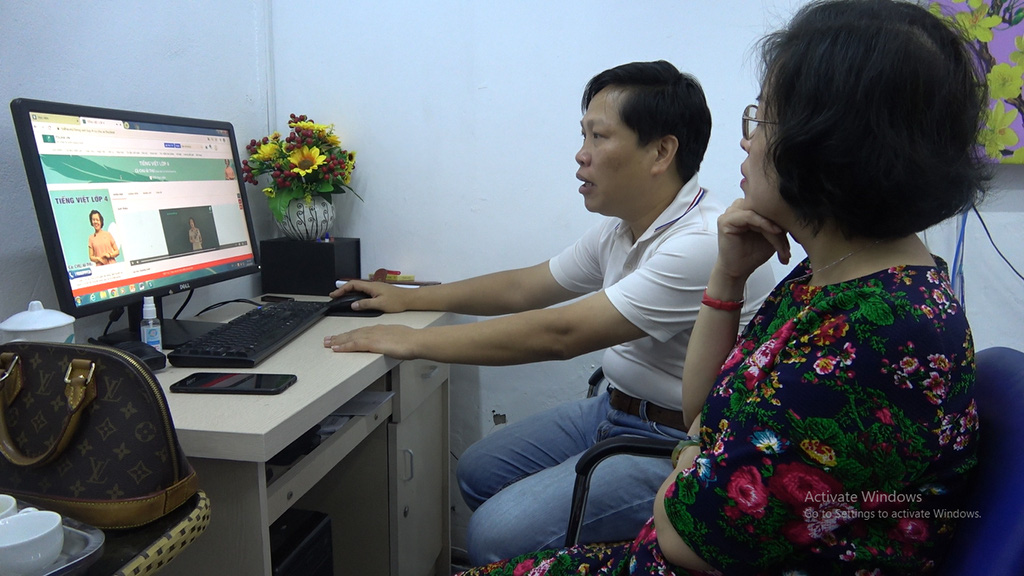Due to the closure of public schools and night classes, teachers around Vietnam are bearing quite a hit to their income. They have taken to an online-teaching approach in the face of the situation.
“Before the Tet [Lunar New Year] holiday, I was running several English classes, both interactive and highly entertaining. Now our school has come to a complete halt,” said Kevin Vinh, a teacher of English in Ho Chi Minh City.
Vietnam reported its first cases of novel coronavirus disease (COVID-19) in late January, just days before the Lunar New Year.
The disease has since been reported in 26 provinces and cities in the Southeast Asian country, with 241 cases confirmed and no death recorded to date.
The transmission of the virus has not only taken its toll on English centers which often offer classes during the evening hours, but also elementary, middle, and high schools that operate during the day.
Learners few and far between
Teachers during this time are at a crossroads. They can either have a full unpaid break, seek some other errands to run, or keep up with the job using web-based teaching tools.
As a teacher of English, Kevin Vinh has lost all of his tutor classes, as safety and social distancing are highly prioritized.
Basically, outsiders are not welcomed in anybody’s houses except in cases of emergency.
“I can understand the difficulty that everybody else is going through, so I am charging a mere VND80,000-100,000 [US$3.4-4.25] per online teaching hour,” he said.
“However, students are few and far between.”
Currently, he has only two classes, which fail to provide him with adequate earnings for fundamental living expenses.
The once stable monthly income of VND10 million ($425) was history.
A veteran private tutor of English, Nguyen Hoang Phuc is going through a tougher time, for he is a wedded man fathering a newborn child, which means there are added expenses to shoulder.
“For the last decade, I have been confident of my teaching skills as my students score really high in national tests, so I decided to tutor full-time instead of applying for a public school position,” he said.
In Vietnam, being a public school teacher brings about a stable salary every month even during summer breaks.
“I didn’t like the pressure of school regulations, and tutoring also means flexible hours and a good earning,” he added.
“Who would have anticipated this pandemic? My nine classes are now reduced to only one.”
Despite deep concerns for his family’s finance, Phuc has received some positive news from parents saying they would rather have their children participate in online classes than stay home doing nothing for the time being.
Getting used to the trend
While running an online class is an idea rather alien to the majority of teachers at elementary, middle, and high schools in Vietnam, many have resorted to recruiting students for online tutoring hours during the ‘virus season.’
Nguyen Thi Phuong Lien is an elementary school teacher at CND International School in Ho Chi Minh City.
Lien now advertises her online classes for grades 3, 4 and 5 in posts on her social media account even though the term ‘online teaching’ was not in her book prior to the pandemic.
“When the school closed, the administrators encouraged us to continue teaching via web-based teaching tools. So I dabbled my feet in the field,” she said.
“The biggest hurdle is scheduling the sessions so that all students can participate. Then I’ll have to make sure the lessons are appropriately designed for this online teaching platform. It takes a lot of preparation, actually,” she explained.
Moving a class online means the instructor needs to utilize a videoconferencing tool that allows live interaction with a group of people, i.e. a video group chat.
The group call functions of Facebook and Zalo – a popular chat app in Vietnam – can cater for basic teaching needs, but Zoom is highly preferred amongst teachers, as it is a free online videoconferencing tool that can accommodate dozens of students at a time.
Zoom also simulates a real classroom environment in that students can raise their hands (by pressing a button), interact (by speaking into their microphone), and see the teacher’s screen clearly thanks to it being bigger than the rest.
Besides running classes for her school, Lien recruits more students for on-the-side tutoring sessions.
Online tutoring, indeed, has increased in popularity among teachers in recent months.
According to Pham Bich Hong, a fifth-grade teacher, what challenges tutors is that both parents and children are not used to online learning, so they doubt its effectiveness and are reluctant to pay for online tutoring sessions.
“We have to offer a taster for the first few days, and once they have gotten used to it, we will discuss the pay,” she added.
Hong charges an hourly VND15,000 ($0.64) per student for a large group, VND50,000 ($2.12) for a small group, and VND100,000 ($ 4.25) for one-on-one sessions.
“I do organize online classes for students at my school, but I also offer online tutoring hours to those students preparing for the college admission exam,” said Tran Phuong Duy from NS High School in Hanoi, referring to the annual National High School Examination for 12th-graders in Vietnam.
Since online teaching and learning is rather a novelty, teachers have formed social media groups discussing their strategies and sharing tips.
|
|
| Le Minh Phan (left) is a chemistry teacher and runs an online teaching company. He and his teams have worked hard for the past month preparing their teaching platforms to serve teachers and parents. Photo: Tam Le / Tuoi Tre |
The whole learning approach might change
“This could well be the very first time in the history of Vietnam’s education when all school levels are taking to the digital environment,” claimed Le Minh Phan, a chemistry teacher and leader of an online teaching company in Hanoi.
In the face of the pandemic, his company offers free access to their website’s online teaching tool to students across Vietnam.
The results were staggering. Only after a week, their operators are up to their ears at work due to an excessive number of phone calls reaching their hotline.
“Most parents call for instructions on how to access the tool, even though we have written them all out very clearly. But they still say they can’t do it,” Phan said.
Indeed, for many people living in rural areas, computer terminologies can be quite a whole new world. Terms like ‘Google,' ‘Gmail,' ‘homepage,' ‘website,' and more may all sound too strange to them.
However, Phan and his team were dedicated to providing thorough guidance, making sure their clients get full access to the content they need.
“This is the first time I’ve seen so many students in the country sign up for online learning,” Phan said.
“Now they only need an average smartphone with 3G or 4G data service, and online learning is just a click away.
"What we’ll have to do is make sure the websites we design are good enough.”
Like us on Facebook or follow us on Twitter to get the latest news about Vietnam!


















































